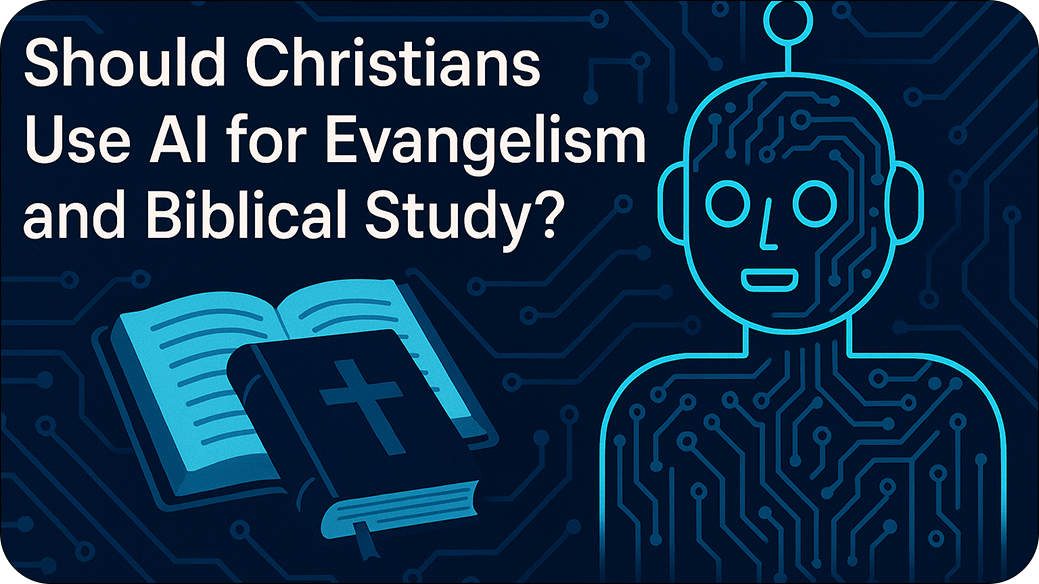We live in a world full of tools. Some build, some destroy. The question is never just what you’re using, but how. Artificial intelligence, like AI tools, is no different. Used the wrong way, it can spread confusion, false doctrine, or religious fluff that has no foundation in God’s Word. But used with wisdom, under the authority of Scripture, it can actually help sharpen your evangelism, expose false teaching, and keep your answers rooted in truth, not opinion.
Let’s get something straight up front: using AI to help ensure your answers line up with Scripture is not rebellion against the Holy Spirit. It’s a way of submitting to Him. The Spirit of God will never lead you to say something that goes against what He already wrote. Jesus said the Holy Spirit “shall not speak of himself, but whatsoever he shall hear, that shall he speak… He shall glorify me” (John 16:13–14). And how does He speak? Through the Word He inspired. If someone says, “The Spirit told me,” but what they’re saying contradicts the Bible in context, then it wasn’t the Spirit of God, it was their imagination, or worse.
That’s why Sola Scriptura matters. The Bible is the final authority. The Holy Spirit works through the Word, not apart from it. And that’s exactly why tools like AI can be useful if you train them to only echo Scripture, not man-made commentary, traditions, or denominational garbage.
Some people push back hard on this. They say, “Don’t use AI, just be led by the Spirit.” But that kind of talk usually comes from those who don’t want their opinions exposed by the light of Scripture. If what you believe is biblical, you shouldn’t be afraid of testing it. But if you’ve added your own tradition or twisted verses to push a false teaching, then of course you’ll hate a tool that instantly checks your claims against the entire Bible.
The Bible commands us to test everything. “Prove all things” (1 Thessalonians 5:21). “Rightly divide the word of truth” (2 Timothy 2:15). “Search the Scriptures daily” (Acts 17:11). This isn’t optional. If AI can help you do that faster, more thoroughly, and more precisely, then why wouldn’t you use it? That’s not taking a shortcut, that’s using discernment.
But make no mistake, AI is not the source of truth. It’s just a tool. It has no authority. It doesn’t replace the Spirit. It doesn’t replace the Bible. It can only reflect what you feed it. If you ask it open-ended spiritual questions with no guardrails, you’ll get a blend of worldly wisdom, religious fluff, and Scripture taken out of context. But if you train it, if you tell it to stay within Sola Scriptura, to stick to the Bible and reject anything outside of it, then it can help you study, prepare, and respond with more biblical accuracy.
This is not about trusting technology. I don’t follow AI, I follow Christ. But if a tool helps me better obey His Word, sharpen my answers, and keep my teaching free from man’s influence, then I’ll use it. Not because I need it, but because I want to be faithful. “To the law and to the testimony, if they speak not according to this word, it is because there is no light in them” (Isaiah 8:20).
If someone is afraid of having their words tested by Scripture, they’re not walking in the Spirit, they’re walking in pride. Anyone can say they’re being “led,” but if it doesn’t match what’s written, it’s not from God. Period.
Using AI in evangelism is no different than using a pen, a concordance, or a Bible app. It’s not good or evil by itself. It depends on how you use it. And if you’re going to use it, do it right. Instruct it to rely only on Scripture. No outside opinions. No man-made theology. Just the Bible. Then test everything it gives you, because you’re still responsible for the words you speak and the truth you represent.
Here’s the bottom line: AI is not your authority. The Bible is. If what you say matches God’s Word, the tool you used to check it doesn’t matter. And if it doesn’t match the Bible, then it’s wrong, no matter how clever or spiritual it sounds.
Just remember, the key is to keep everything submitted to Scripture is correctly setting your AI Parameters. AI is only useful if you train it to stick to the Bible and reject anything outside of it. Always test what it gives you by the Word of God (1 Thessalonians 5:21), and let the Bible be the final say in all things (2 Timothy 3:16–17). If it helps you stay faithful to truth, use it. If not, toss it.
Let the Word of God be your standard, and use whatever helps you stay faithful to it. That’s not a compromise, that’s obedience.
Views: 5

